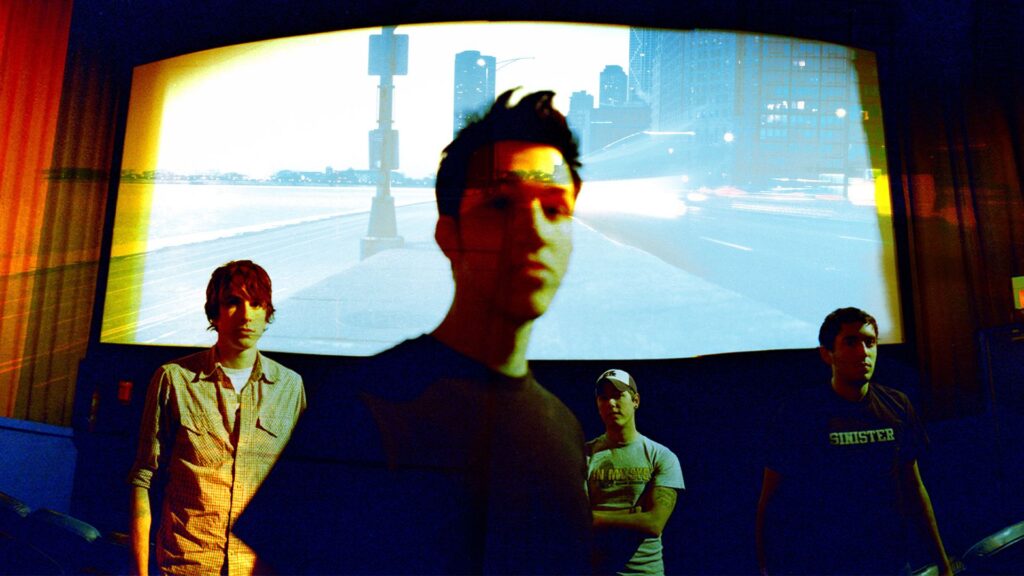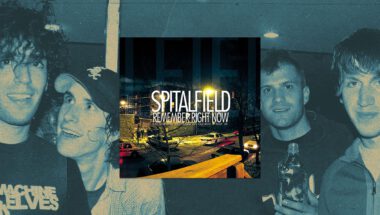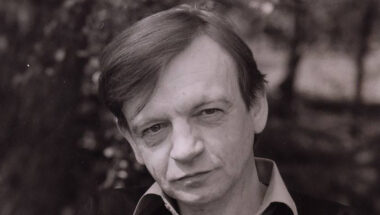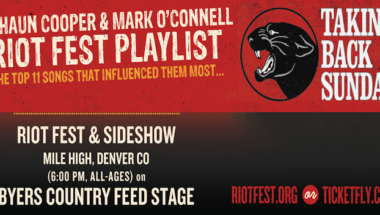When Mark Rose, J.D. Romero, Dan Lowder and T.J. Minich formed Spitalfield at Glen Ellyn’s Glenbard South High School back in 1998, they couldn’t have imagined they’d still be doing this a quarter of a century later. The pop-punk heroes are currently in the middle of a tour celebrating the 20th anniversary of their seminal album Remember Right Now, including a sold out show at Cobra Lounge a few weeks ago.
Featuring classic songs like “Those Days You Felt Alive,” “Stolen From Some Great Writer” and the immortal “I Loved The Way She Said L.A.,” Remember Right Now was a giant leap forward for the band. Recorded at Butch Vig’s Smart Studios, where artists like Garbage, Smashing Pumpkins and Nirvana created the music that defined an era, the album combines the best elements of Chicago’s early-aughts punk scene with clever pop songwriting and unexpected indie rock influences.
Chicago Tribune music editor Greg Kot admired how they gave the “pop-punk formula a more nuanced spin” in an era when the previous decade’s biggest bands had become staples on TRL and Top 40 radio. BrooklynVegan said there were “more memorable hooks on this album alone than some of the bigger bands had throughout their whole careers.”
If you were part of the scene, Remember Right Now was everything.
We caught up with Spitalfield frontman Mark Rose for a look back at their breakthrough album, the Chicago venues that shaped them and their upcoming performance at Riot Fest.
Riot Fest: This year marks the 20th anniversary of Remember Right Now, which feels absolutely crazy. What does that album mean to you when you listen to it now?
Mark Rose: It does feel crazy! So much of the album’s theme is centered around preparing for an uncertain future. What is wild is now living (and having lived) that future. The nostalgia dominates when listening back again, but it’s also special to reconnect with the songs from our current point of view.
RF: You recorded it at Butch Vig’s Smart Studios in Madison, a studio with a lot of history. What was that like?
MR: Intimidating. The biggest difference between making this record and recording anything else we had done up until that point was the preparation. With a young and hungry Sean O’Keefe behind the boards, he worked with us on things we hadn’t really done before. One example would be pre-production. Actually working on the songs and digging into them (and not just demoing them) was new to us. Sean made the most of that incredible studio by working way too many hours while we were there. I swear he averaged 20 out of 24 hours, and was taking power naps on the couch and then starting up again, and occasionally falling asleep at the board. We had a finite amount of time to be there, so he made sure we made the most of it. Hearing some great recording stories from iconic sessions was inspiring. Also, we got to meet Shirley Manson!
RF: You’re currently celebrating the album with a tour that included a sold out show at Cobra Lounge. What local venues were most important to Spitalfield’s story?
MR: The Metro will always hold a place near and dear to our hearts. There are very few venues that can legitimately check these three boxes: “saw shows that changed your life” + “saw your favorite shows” + “played your favorite shows.” Honorable mention to The Fireside, which can also check those boxes. Shout-outs to the Darien Sportsplex and Wheaton Grand Theater.
RF: What about the Glen Ellyn YMCA?
MR: Cheers to the Glen Ellyn YMCA! Some loud memories there. There were no good rooms to have shows, but there were so many good shows all the same.
RF: What’s the response like when you revisit some of the album’s deep cuts like “in the Same Lifetime” or “You Can’t Stop” live?
MR: I think “In the Same Lifetime” is hitting us pretty hard, and I think it’s translating to the audiences that are mostly made up of folks who had this album hit them during their formative years. I always loved that song, and playing it now feels special. “You Can’t Stop” is fun because it’s a jam that we played a lot *before* Remember Right Now came out, and only occasionally after. The energy is up on that one, and it’s a bit of a darkhorse for the back-end of the album.
RF: You also did some acoustic sets during your run of dates with Hawthorne Heights and Armor for Sleep. How does that change the way you approach the show, creating a setlist, etc.?
MR: Luckily, I have done that sort of thing a number of times… also specifically opening for Hawthorne Heights. The full band was on the first couple weeks, and then an additional week got added which they couldn’t all commit to. No way I was gonna let the opportunity pass, so we made it work. The approach is to try and win the crowd over by being personable and honest with them. When it works, it’s kinda awesome. Missed having the other fellas up there, and the energy that comes with that… but I’m very used to playing solo. I tried to keep things upbeat when playing Spitalfield songs, and had some fun tossing in an occasional Metallica cover to grab folks’ attention.
RF: Chicago is all over the album artwork. Can you hear it in the music?
MR: I can because we wrote the majority of those songs while I was living in my first Chicago apartment, and attending Columbia College. Chicago was always a destination when you’re growing up in the nearby suburbs, and of course we also took a fair amount of influence from our favorite Chicagoland bands growing up.
RF: In addition to Remember Right Now, 2003 saw massive albums from local bands like Fall Out Boy and Alkaline Trio. Was there just something in the water that year?
MR: It would seem so! The local scenes have almost always had some solid output, and the waves can be powerful when something is catching on. At the time, it wasn’t easy to really put a finger on it, because it was all happening fast and in real-time. It’s a lot easier to recognize how wild it was looking back.
RF: This is also the 25th anniversary of the band! If you think back to 1998, who were the artists who made you want to do this?
MR: I can easily and accurately narrow it down to three specific bands: Texas is the Reason, The Get Up Kids, & The Promise Ring. Our original guitarist has an older brother who was our gateway to lots of music… and those three artists in particular made us want to start the band. We were actually a side project to the other punk and hardcore bands we were all in, but it slowly became the focus.
RF: You’re back at Riot Fest after a killer album set in 2018. Who should people check out on this year’s lineup? (In addition to Spitalfield, of course.)
MR: The lineup is so stacked! A few sets I’m particularly excited about – Braid, Snapcase, & Rival Schools.
Riot Fest 2023 Tickets + Lineup
Single day tickets are available now to see Spitalfield at Riot Fest with The Postal Service, Death Cab for Cutie, PUP and more on Saturday, September 16.
Haven’t bought your ticket yet?
Well, now you can. Here are some buttons to do just that.



